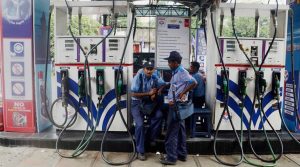$100 Website Offer
Get your personal website + domain for just $100.
Limited Time Offer!
Claim Your Website NowCan petrol, diesel prices be made same for four wheelers, Supreme Court asks Centre
Source – indianexpress.com

The Supreme Court on Friday directed the Centre to apprise it as to whether petrol and diesel can have an equal pricing for four wheelers and private cars after the Environment Pollution Control Authority (EPCA) said pollution from diesel vehicles was a cause of concern.
A bench of justices Madan B Lokur and Deepak Gupta suggested that the government could contemplate fixing price of diesel and petrol on par for four wheelers, other than goods vehicles. “You take instructions whether you can have equal price at petrol stations for diesel and petrol for four wheelers and private cars,” the bench told the counsel appearing for the Centre.
Advocate Aparajita Singh, assisting the apex court as an amicus curiae in the matter, told the bench that the real concern was pollution from diesel vehicles. She said that people go for diesel vehicles since they have high power fuel efficiency. The amicus told the bench that one of the EPCA’s report show there was “leakage” of funds from environment compensation charge (ECC) which was levied by the apex court for purchase of diesel vehicles.
“But SIAM (Society of Indian Automobile Manufacturers) says that they (diesel vehicles) are not polluting. They are arguing that you change your standards,” the bench observed. The court then referred to media reports and said that Germany was contemplating banning use of diesel vehicles.
The amicus told the court that European countries were trying to fix NOx (nitrogen oxide) pollution standards since they were grappling with pollution and Germany was trying to do away with diesel vehicles. The bench, while referring to Article 14 (equality before law) of the Constitution, said that government could consider fixing price of diesel and petrol on par for four wheelers.
The counsel, appearing for vehicle manufacturers, told the apex court that BS-VI fuel, which is likely to be made available in National Capital Region (NCR) from April 2019, would solve the problem of pollution from diesel vehicles. He said that in August 2016, sell of diesel vehicles was almost 47.5 per cent which has come down to 23 per cent now. The bench then asked about use of electric vehicles in India.
One of the lawyers told the court that Delhi government has proposed to buy around 1,000 electric buses for public transport while 1,000 electric vehicles were already plying on the roads in different parts of the country. He said that these electric vehicles were manufactured by automobile majors Tata and Mahindra.
The amicus also told the court that Tata and Mahindra has also signed contract with app-based taxi services Ola and Uber for supply of fleet of electric cars and the Centre has also ordered electric vehicles. The bench suggested that possibility of using hydrogen fuel cell-powered vehicles, which are of hybrid nature and considered cost-effective as compared to CNG or electric vehicles, should also be explored.
The amicus said that Indian Oil Corporation was upbeat about Hydrogen fuel cell-powered vehicles and they have the requisite technology for it. The amicus also told the bench that EPCA has suggested about use of colour-coded system, as already used in Paris, which would help in having graded fuel for vehicles depending upon the pollution emitted. The bench said that it would hear further arguments in the matter on July 23.
The Centre had earlier told the apex court that BS-VI fuel would be available by April 1, 2019 in 17 out of 23 districts in the NCR and Agra and all attempts would be made to make it available in other metropolitan cities by April 1, 2020. The government had also said that reducing the price gap between petrol and diesel would not be “economically viable” and would lead to inflation. The court was hearing the petition which has raised the issue of air pollution in the Delhi-NCR.



